2014仁爱版九年级unit1单元语法、知识点总复习(有对应习题及答案)
仁爱英语九年级第一单元词组归纳整理 英语试题知识点考点 单元综合试题答案及解析
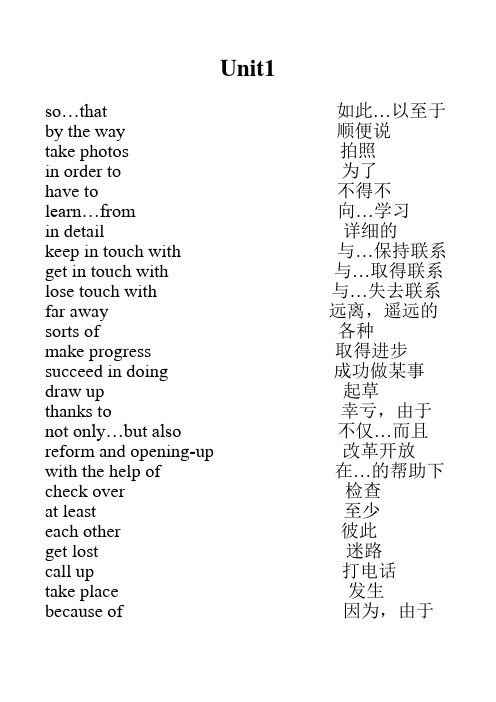
Unit1so…that 如此…以至于by the way 顺便说take photos 拍照in order to 为了have to 不得不l earn…from向…学习in detail 详细的keep in touch with 与…保持联系get in touch with 与…取得联系lose touch with 与…失去联系far away 远离,遥远的sorts of 各种make progress 取得进步succeed in doing 成功做某事draw up 起草thanks to 幸亏,由于n ot only…but also不仅…而且reform and opening-up 改革开放with the help of 在…的帮助下check over 检查at least 至少each other 彼此get lost 迷路call up 打电话take place 发生because of 因为,由于write down 写下be short of 短缺so far 至今,到目前为止take measures to do sth 采取措施做某事deal with 处理more than 多于,超过less than 少于a couple of 一些,几个keep up with 赶上,跟上catch up with 赶上belong to 属于place of interest 名胜古迹increase to/by 增加到/了carry out 执行developing country 发展中国家developed country 发达国家be known(famous)as 作为…而出名be known(famous)for 因为…而出名work out 算出get used to doing 习惯于as a matter of fact 事实上in need 在困难时at home and aboard 国内外pay for 为…付款decide on 决定provide sb with sth 为某人提供某物provide sth for sb 提供某物给某人in trouble 处于困难/麻烦中。
仁爱九年级上学期Unit1重点词组与句型归纳含练习试题

Unit 1 The Changing WorldTopic 1 Our country has developed rapidly.一:重点词汇1.have /has been to ….去过、、、、、、(已回来)去、、、、、(还未回来)2.have/ has gone to ….3.take place 发生4.see sth oneself 亲眼所见5.keep in touch with 保持联系6.make progress 取得进展7.succeed/be successful in doing sth. 成功地做某事8.take an important part in... 在...起到重要作用9.remember the past 记住过去10.live in the present 立足现在11.dream about the future 展望未来12.in the past 在过去13.at present 在如今14.at home and abroad 国内外二:重点句型1.Great changes have taken place there and my hometown has become moreand more beautiful.那儿已经发生了很大的变化,我的家乡已经变得越来越美丽了。
2.There were so many people that I couldn t find a proper place to take photos.那的人是如此之多,以致于我找不到适合拍照的地方。
3.Though I had no time to travel, I still felt very happy.虽然我没有时间去旅游,但我仍然觉得很快乐。
4.Parents couldn’t afford an education for their children.父母亲供不起孩子上学。
仁爱版九年级英语unit1,Unit2重点语法
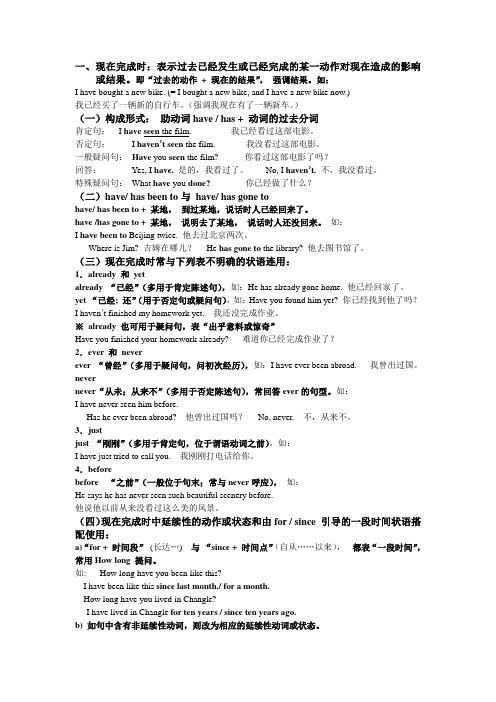
一、现在完成时:表示过去已经发生或已经完成的某一动作对现在造成的影响或结果。
即“过去的动作+ 现在的结果”,强调结果。
如:I have bought a new bike. (= I bought a new bike, and I have a new bike now.)我已经买了一辆新的自行车。
(强调我现在有了一辆新车。
)(一)构成形式:助动词have / has + 动词的过去分词肯定句:I have seen the film. 我已经看过这部电影。
否定句:I haven’t seen the film. 我没看过这部电影。
一般疑问句:Have you seen the film? 你看过这部电影了吗?回答:Yes, I have.是的,我看过了。
No, I haven’t.不,我没看过。
特殊疑问句:What have you done?你已经做了什么?(二)have/ has been to与have/ has gone tohave/ has been to + 某地,到过某地,说话时人已经回来了。
have /has gone to + 某地,说明去了某地,说话时人还没回来。
如:I have been to Beijing twice. 他去过北京两次。
---- Where is Jim? 吉姆在哪儿?--- He has gone to the library? 他去图书馆了。
(三)现在完成时常与下列表不明确的状语连用:1.already 和yetalready “已经”(多用于肯定陈述句),如:He has already gone home. 他已经回家了。
yet “已经; 还”(用于否定句或疑问句),如:Have you found him yet? 你已经找到他了吗?I haven’t finished my homework yet. 我还没完成作业。
※already 也可用于疑问句,表“出乎意料或惊奇”Have you finished your homework already? 难道你已经完成作业了?2.ever 和neverever “曾经”(多用于疑问句,问初次经历),如:I have ever been abroad. 我曾出过国。
仁爱英语九年级上Unit1单元重点知识复习及练习题

仁爱英语九年级上Unit1单元重点知识复习及练习题1. take place 发生eg: Great changes have tanken place in my hometown.2.Though I had no time to travel, I still felt very happy this holiday! 尽管我没时间去旅游,但这个假期我仍然感到很愉快。
though 从属连词,用来引导让步状语从句,表“虽然;尽管”,不能与but连用。
如:Though he is poor, he is happy. = He is poor, but he is happy. 尽管他很贫穷,但是他很快乐。
3.Could you please tell me something about Chinese teenagers? 请告诉我一些有关中国青少年的一些事情好吗?Could /Would you please (not) do sth?请(不)做某事好吗?eg: Could you please turn down your radio? 请把收音机声音调低好吗?Would you please not play football here? 请不要在这儿踢球好吗?4.Parents couldn’t afford education for their children. 父母供不起孩子上学。
afford 常与can, could 或be able to 连用,尤其用于否定句或疑问句,表“负担得起(做)某事;抽得出(时间)”“(can’t/ couldn’t) afford (to do) sth.”eg: We can’t afford (to buy ) this house because we don’t have enough money. 我们买不这房了,因为我们没有足够的钱。
仁爱版九年级unit单元语法知识点总复习有对应习题及答案
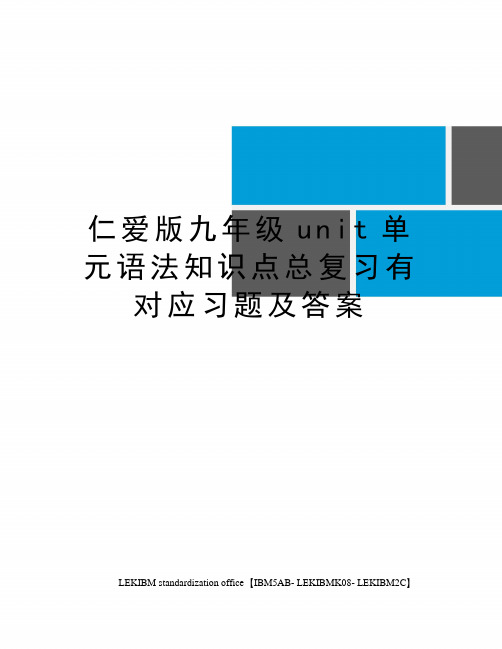
仁爱版九年级u n i t单元语法知识点总复习有对应习题及答案LEKIBM standardization office【IBM5AB- LEKIBMK08- LEKIBM2C】九年级英语Unit1单元归纳复习及相应课堂习题(含每个topic作文)1. Have/has been to, have/has gone to 和 have/has been in的区别主语+have/has been to + 地点“去过某地”(已返回)1 主语+have/has gone to +地点“去了某地”(未回来)主语+have/has been in +地点+for +段时间(待在某地,动作可以延长一定时间,后面常接段的时间)She has been in Japan for 2 year.She has been to Japan. She has gone to Japan.▲地点是名词须接to ,如果地点是副词则不接to。
Tom has been there.▲对地点提问用:where2.频度副词already,yet ,just,ever,never,在现在完成时中的作用3.4.(1)already 用在肯定句,用与句中,句尾均可,“已经”5.I’ve finished my homework already. I’ve already finished my homework .6.(2)yet 用于否定句或疑问句,“还”,用于句末。
在现在完成时的用法中,肯定句常用already,改用否定句和一般疑问句时常把already改为 yet(放句末)。
I have already found him.Have you found him yet(3)Just位于谓语动词前。
“刚刚”(也可以用于一般现在时,过去时态) He has just come back from France.(4) ever 多用与一般疑问句,否定句和条件状语从句中,“曾经”Have you ever been to France No, I haven’t. /Yes,I have.If you ever happen to come here ,be sure to visit us.(5)never 多用于否定的陈述句中,“从不……” (反义词是ever)I have never travelled on a plane.(变成一般疑问句)Have you ever travelled on a plane?He is never late for school. (它还可以用于其他时态中)(6)before 做副词时,”从前“,句中谓语常用现在完成时和过去时。
仁爱版九年级英语 unit1 topic1知识点

九年级英语上册笔记Unit1 topic1 SectionA1.复习时态1).进行时(2种): be(are/am/is/was/were)+doing sth. 2). 一般将来时:will/shall+do sth. /be going to do sth. (won’t)3).一般现在时:主语+动词(v+s/es)+宾语(don’t/doesn’t)4).一般过去时:主语+动词(v+ed)+宾语(wasn’t/weren’t/didn’t)5).现在完成时:助动词have/has+过去分词(v+ed)(haven’t/hasn’t)定义:表示动作已经完成,对现在产生影响。
没有过去时间,一般与副词already(已经)、ever(曾经)、never (从不)、just(刚刚)、before (以前)、yet(还)、once/twice/three times(一次/两次/三次)、for(为多久)、since(自从)等连用。
2.h ave/has been to…曾经去过,人已回来。
Have/has gone to…人去了,还没回。
3.b e happy to do sth. 开心做某事4.c ome back from…从。
返回5.t ake place 发生6.m ore and more 越来越…(可接名词或多音节形容词)7.s o…that…/such…that…/so that…如此…以至于…/因此注意:so+形容词/副词such+名词短语特殊情况:名词前如果出现many/much/little/few时要用so. Eg: so many people/apples so much food/money8.t ake photos 照相9.i mprove your English 提高英语水平10.by the way 顺便说一下on the way to在…去的路上in the way 挡路out of the way 偏远的11.There goes the bell. 倒装句铃声响了。
仁爱英语九年级unit1topic1知识点归纳

换(v.)”””一’系’’节G9Unit1Topic1Topic1Our country has developed rapidly.一、重点词汇(一)词形转1.training--train“训练2.rapid(adj.)---rapidly(adv.)3.recent(adj)--recently(adv.)4.develop(v.)--development(n.)--developed“发达的;developing“发展中的(adj.)5.narrow(反义词)--wide(二)重点短语★SA8.have the chance to do sth.有机会做某事1.have a good summer holiday9.receive a good education接受良好的教育过一个愉快的暑假10.keep in touch with sb by letter ortelegrame back from⋯从⋯⋯回来3.take place发生4.have/has been to...去过⋯⋯5.so...that...如此⋯⋯以至于6.improve my English提高我的英语水平7.by the way顺便问问8.have/has been to...已经去了★SB1.take part in参加2.volunteer activities志愿者活动3.in a disabled childrens home在一家残疾儿童养育院4.feed sb.喂某人5.a wonderful experience一次精彩的经历6.learn⋯from从⋯⋯当中学习通过书信或电报与某人取得联11.far away遥远12.the reform and opening-up改革开放13.taller and brighter又高又明亮14.satisfy ones needs满足某人的需要15.not only⋯but also⋯不但⋯⋯而且⋯⋯16.enjoy good medical care享受很好的医疗保健17.whats more而且18.make rapid progress取得很大/快速进步19.succeed in doing sth成功地做某事20.remember the past记住过去21.live in the present立足现在7.had(no)time to do sth.有(没)时间做⋯⋯22.dream about the future展望未来8.put on funny shows for sb为某人表演有趣的目9.a group of一组,一群10.something meaningful一些有意义的事情11.do some farm work干一些农活★SC1.in the past在过去2.at present现在3.more than超过,多于4.see.oneself⋯亲眼看见⋯⋯5.living conditions生活条件6.ring roads环23.the course of⋯⋯的过程★S D1.leisure activities休闲活动2.play an important part in在⋯⋯中发挥重要用3.play hide-and-seek捉迷藏4.play chess下棋5.in one's spare/free time在某人空闲时6.spend...o n sth.花费⋯⋯在⋯⋯上7.various kinds of各种各样8.both...and...不仅⋯⋯而且⋯⋯9.places of interest作形道路7.be crowed into 挤在⋯⋯名胜古迹10.in the open air在户外1二、重点句型。
(完整版)仁爱英语九年级上册知识点归纳
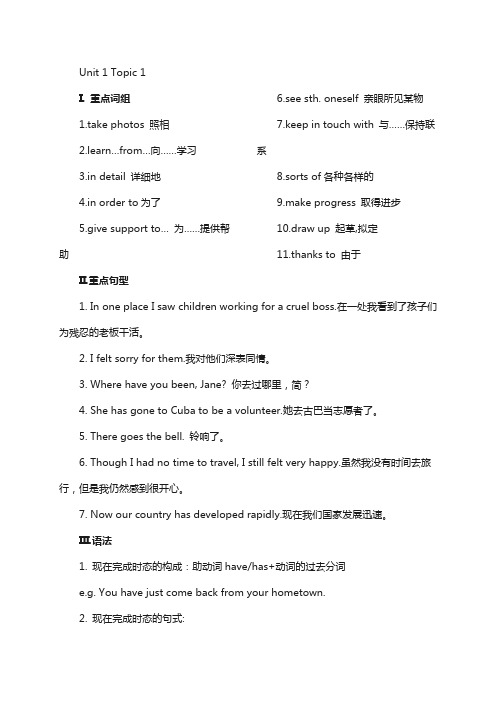
Unit 1 Topic 1I. 重点词组1.take photos 照相2.learn…from…向……学习3.in detail 详细地4.in order to为了5.give support to…为……提供帮助6.see sth. oneself 亲眼所见某物7.keep in touch with 与……保持联系8.sorts of各种各样的9.make progress 取得进步10.draw up 起草,拟定11.thanks to 由于II.重点句型1. In one place I saw children working for a cruel boss.在一处我看到了孩子们为残忍的老板干活。
2. I felt sorry for them.我对他们深表同情。
3. Where have you been, Jane? 你去过哪里,简?4. She has gone to Cuba to be a volunteer.她去古巴当志愿者了。
5. There goes the bell. 铃响了。
6. Though I had no time to travel, I still felt very happy.虽然我没有时间去旅行,但是我仍然感到很开心。
7. Now our country has developed rapidly.现在我们国家发展迅速。
III.语法1. 现在完成时态的构成:助动词have/has+动词的过去分词e.g. You have just come back from your hometown.2. 现在完成时态的句式:e.g. (1) I have been to Mount Huang with my parents.(2) I haven’t seen him for a long time.(3) Where have you been?(4) ——Have you ever cleaned a room? ——Yes, I have. / No, I haven’t.3. have/ has been与have/has gone 的区别have/has been to sp.表示曾经到过某地——have/has gone to sp.表示已经去了某地e.g. (1) I have been to Mount Huang with my parents. (2) She has gone to Cuba to be a volunteer.Unit 1 Topic 2I. 重点词组1. get lost 迷路2. each other 彼此3.at least 至少4take place发生5because of 因为6.be strict with sb. 对某人严格要求7.carry out 实行8.be short of 缺乏9.take measures to do sth.采取措施做某事10.be known as…作为……而著名11.work well in doing…在……方面起作用12.a couple of 一些13keep up with赶上,跟上II.重点句型1. Have you found him yet? 你已经找到他了吗?2. ——I really hate to go shopping. 我的确讨厌购物。
仁爱版英语九年级Unit1Topic1知识点
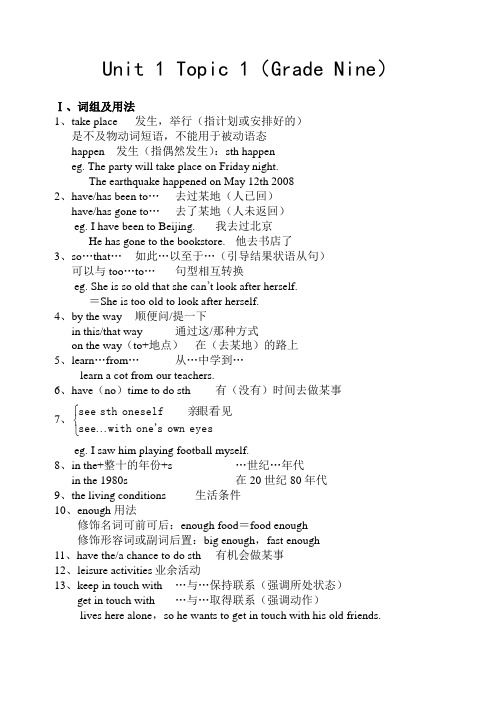
Unit 1 Topic 1(Grade Nine )Ⅰ、词组及用法1、take place 发生,举行(指计划或安排好的)是不及物动词短语,不能用于被动语态happen 发生(指偶然发生):sth happeneg. The party will take place on Friday night.The earthquake happened on May 12th 20082、have/has been to … 去过某地(人已回)have/has gone to … 去了某地(人未返回)eg. I have been to Beijing. 我去过北京He has gone to the bookstore. 他去书店了3、so …that … 如此…以至于…(引导结果状语从句)可以与too …to … 句型相互转换eg. She is so old that she can ’t look after herself.=She is too old to look after herself.4、by the way 顺便问/提一下in this/that way 通过这/那种方式on the way (to+地点) 在(去某地)的路上5、learn …from … 从…中学到…learn a cot from our teachers.6、have (no )time to do sth 有(没有)时间去做某事7、⎩⎨⎧⋯eyes own s one'with see 眼看见oneself 亲 sth see eg. I saw him playing football myself.8、in the+整十的年份+s …世纪…年代in the 1980s 在20世纪80年代9、the living conditions 生活条件10、enough 用法修饰名词可前可后:enough food =food enough修饰形容词或副词后置:big enough ,fast enough11、have the/a chance to do sth 有机会做某事12、leisure activities 业余活动13、keep in touch with …与…保持联系(强调所处状态) get in touch with …与…取得联系(强调动作)lives here alone ,so he wants to get in touch with his old friends.14、far away 遥远(常放句末作后置定语)work in a city far away.far away from+某地离…遥远eg. Their school is far away from here.*如果前有具体数字,far要去掉eg. His home is 9 kilometers away from the school.15、develop 动词:发展,发达developed 形容词:发达的,发展的developing 形容词:发展中的development 名词:发展China is a developing country.16、satisfy(v.)使满意——satisfied(adj.)满意的satisfy sb. 使某人满意satisfy people’s needs 满足人们的需求eg. Well try to satisfy all the guests.be satisfied with …对…感到满意eg. Her parents are satisfied with her exam results.17、not only…but also…不但…而且…连接并列主语时,谓语动词用就近原则Not only my friends but also I am interested in the book.18、care(n.)照料,照顾medical care医疗保健patient care病人护理take care of sb/sth 照顾某人/物=care for…care(v.)关注,在意care about sb/sth 在意某人/物19、make progress 取得进步make great/rapid progress 取得重大/快速进步20、succeed in sth/doing sth 成功做某事21、dream about 梦想,展望22、play a part/role(in sth)在…发挥重要作用,在…扮演重要角色eg. The computer plays an important part in our lives.23、play hide―and―seek 玩捉迷茂24、meet to play cards 聚在一起玩牌25、in one’s spare/free time 在某人的空闲时间26、team sports 团体运动27、in the open air 在户外,露天28、roll iron rings 滚铁环29、go roller skating 滑旱冰30、make a tour abroad 去国外旅游Ⅱ、辨析though ,although ,even though ,even if 都是连词,意为“虽然,尽管,即使”,引导让步状语从句,不与but ,however 连用eg. Though/Although he is only three years old ,he knows a lotⅢ、语法:现在完成时1、结构:助动词have/has+动词的过去分词2、定义:表示过去发生或已经完成的某一动作对现在造成的影响或结果3、常与just ,already ,yet ,ever ,never ,beforefor+一段时间since …,so far ,by now ,these daysin recent years ,in the past …years 等连用4、Tom has already seen the film.(陈述句)Tom hasn ’t seen the film yet.(否定句)⎩⎨⎧t.hasn' he ,has./No he Yes,)一般疑问句( yet?film the seen Tom Has 5、参看课本124Ⅳ、范文Great Changes in My HometownIn the past ten years ,great changes have taken place in my hometown. People in my hometown are living a happy life with the development of our country.Now people in my hometown have lived in beautiful and tall buildings. Roads are getting wider and wider. People ’s living conditions are getting better and better. What ’s more ,children have studied in modern schools and they are getting a good education.I feel very excited about the changes in my hometown and I think my hometown will become.。
仁爱英语九年级上册Unit1-topic1知识点总结

仁爱英语九年级上册知识点归纳Unit 1 The Changing WorldTopic1 Our country has developed rapidly.一、重点短语1.be happy/glad/pleased to do sth. 很高兴做某事2.not bad 还不错e/go/be back 返回4.take place 发生5.by the way 顺便说一下,顺便问一下6.have/has gone to去了某地(还没有回来)Have/has been to 去过某地(已经回来)7.learn from…从……学习8.have no time/money to do sth. 没有时间/钱做某事9.put on 穿上,上映10.in the past 在过去11.at present 现在12.see sth. in person see sth. oneself see sth. with one’s own eyes亲眼目睹13.in the 1960s 在20世纪六十年代14.the living conditions 生活条件15.have a chance/chances to do sth. 有机会做某事have no chance to do sth. 没有机会做某事16.receive/have/get a good education 接受好的教育17.keep in touch with sb. 与某人保持联系get in touch with sb. 与某人取得联系 lose touch with sb. 与某人失去联系18.far away 遥远的 far away from…距……遥远19.the reform and opening-up 改革开放20.since+时间点/时间段ago/一般过去时的从句 for+时间段21.be pleased/satisfied with…对……感到满意22.satisfy one’s needs满足某人的需求23.on the Internet在网上24.make rapid progress 取得快速的进步25.succeed in doing sth. 成功做某事26.play an important part/role 扮演一个重要的角色27.in one’s spare/free time在某人的空闲时间29.places of interest/ interesting places 名胜古迹30.though/although/even though/even if 虽然,尽管,即使引导让步状语从句,不与but连用,但可与still,yet连用。
仁爱版九年级英语上册unit1重要知识点
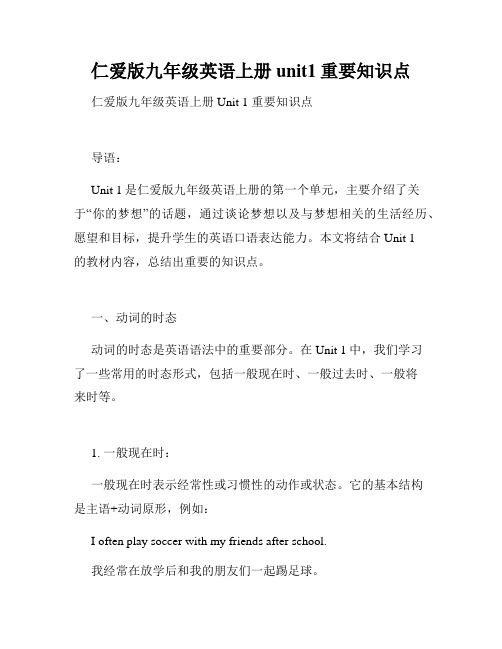
仁爱版九年级英语上册unit1重要知识点仁爱版九年级英语上册Unit 1 重要知识点导语:Unit 1是仁爱版九年级英语上册的第一个单元,主要介绍了关于“你的梦想”的话题,通过谈论梦想以及与梦想相关的生活经历、愿望和目标,提升学生的英语口语表达能力。
本文将结合Unit 1的教材内容,总结出重要的知识点。
一、动词的时态动词的时态是英语语法中的重要部分。
在Unit 1中,我们学习了一些常用的时态形式,包括一般现在时、一般过去时、一般将来时等。
1. 一般现在时:一般现在时表示经常性或习惯性的动作或状态。
它的基本结构是主语+动词原形,例如:I often play soccer with my friends after school.我经常在放学后和我的朋友们一起踢足球。
2. 一般过去时:一般过去时表示过去某个时间发生的动作或状态。
它的基本结构是主语+动词过去式,例如:Last night, I watched an interesting movie with my family.昨晚,我和我的家人一起看了一部有趣的电影。
3. 一般将来时:一般将来时表示将来某个时间要发生的动作或状态。
它的基本结构是主语+will+动词原形,例如:Next week, I will visit my grandparents in the countryside.下周,我将去乡下看望我的祖父母。
二、句型的运用在Unit 1中,我们学习了一些常用的句型,能够帮助我们更好地表达自己的梦想和愿望。
1. What do you want to be when you grow up?当你长大后你想要成为什么?这个句型用来询问对方将来的职业梦想,可以用来提高学生对未来的思考和规划能力。
2. I want to be a/an...我想要成为一个...通过这个句型,我们可以表达自己的梦想和愿望,向他人展示我们对某个职业的向往。
3. Why do you want to be a/an...?你为什么想要成为一个...?这个句型用来询问对方为什么有这样的职业梦想,帮助学生思考自己对某个职业的认知和理解。
仁爱版九年级unit1知识点归纳

仁爱版九年级unit1知识点归纳仁爱版九年级Unit 1 知识点归纳随着九年级新学期的开始,我们迎来了仁爱版九年级英语的第一单元。
这个单元是一个启蒙单元,旨在帮助学生温习初中所学的基本英语知识,并为接下来的学习打下坚实的基础。
在这篇文章中,我将对九年级Unit 1涉及的知识点进行整理和归纳,希望能够帮助同学们更好地理解和掌握。
1. 人称代词首先是人称代词的使用。
在本单元中,我们学习了主格代词和宾格代词的用法。
主格代词用于主语的位置,宾格代词则用于宾语位置。
例如:"I love English."(我喜欢英语。
)"She teaches me."(她教我。
)同时,我们还学习了人称代词的宾格形式(me, you, him, her, it, us, them)。
2. 句子的基本结构句子是英语表达的基本单元,了解句子的基本结构对于我们理解和运用英语非常重要。
在本单元中,我们学习了简单句和陈述句的基本结构。
一个基本的英语句子通常由主语、谓语和宾语组成。
例如:"She drinks milk."(她喝牛奶。
)同时,我们还学习了一些常见的陈述句的变化形式,如一般疑问句、否定句和简略回答等。
3. 祈使句祈使句是我们在日常生活中常常使用的一种句子形式,用于表达请求、建议、命令等。
在本单元中,我们学习了祈使句的基本用法。
例如:"Please open the window."(请打开窗户。
)"Don't be late."(不要迟到。
)和祈使句的一些其他变化形式,如使用助动词"do"的祈使句等。
4. 数词在本单元中,我们学习了数词的基本用法。
数词用于表示数量和顺序。
例如:"There are five apples on the table."(桌子上有五个苹果。
)"She is the first to arrive."(她是第一个到达的。
九年级仁爱版unit1知识点

九年级仁爱版unit1知识点九年级仁爱版Unit 1知识点九年级是一个学习和成长的关键时期,而仁爱版教材Unit 1是我们学习英语的开始。
在这个单元中,我们将学习很多有趣和实用的知识点,以下是一些重要的内容:一、动词的时态动词的时态是学习英语的基础,Unit 1中涉及到了一些常用的时态,比如一般现在时、一般过去时和一般将来时。
在句子中使用正确的时态可以让我们表达自己的意思更清晰、更准确。
例如,在一般现在时中,我们使用动词原形来表达现在的状态或经常性的动作。
比如,“I love to read books”(我喜欢阅读书籍)。
在一般过去时中,我们使用动词的过去式来表达过去发生的事情。
比如,“She studied English last night”(昨晚她学习了英语)。
在一般将来时中,我们使用“will”加动词原形或者be going to加动词原形来表达将来要发生的事情。
比如,“I will go to the movie theater tomorrow”(明天我将去电影院)。
二、名词的单复数名词的单复数也是英语学习中的基础内容之一。
在Unit 1中,我们学习了如何正确地使用名词的单复数形式。
一般来说,名词加s表示复数,但也有一些特殊情况需要记住。
当名词以s、x、ch、sh结尾时,加es表示复数。
比如,“I have two watches”(我有两个手表)。
当名词以辅音字母+y结尾时,变y为i再加es表示复数。
比如,“I have many dictionaries”(我有很多字典)。
当名词以元音字母+y结尾时,直接加s表示复数。
比如,“I have three days off”(我有三天休假)。
当名词以o结尾时,有些名词加es表示复数,有些名词加s表示复数。
比如,“I eat two potatoes”(我吃了两个土豆),但是“I have two radios”(我有两台收音机)。
2014年仁爱英语九年级Unit-1-Topic1知识点归纳
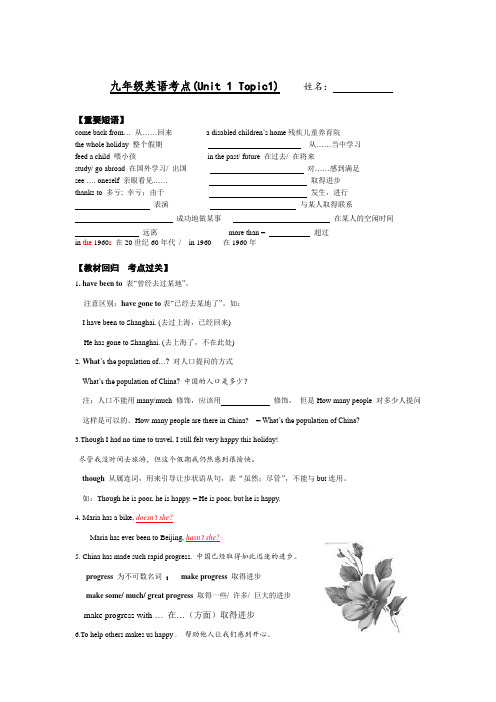
九年级英语考点(Unit 1 Topic1) 姓名:【重要短语】come back from…从……回来 a disabled children’s home残疾儿童养育院the whole holiday 整个假期从……当中学习feed a child 喂小孩in the past/ future 在过去/ 在将来study/ go abroad 在国外学习/ 出国对……感到满足see …. oneself 亲眼看见……取得进步thanks to 多亏; 幸亏;由于发生,进行表演与某人取得联系成功地做某事在某人的空闲时间远离more than = 超过in the 1960s 在20世纪60年代/ in 1960 在1960年【教材回归考点过关】1. have been to表“曾经去过某地”。
注意区别:have gone to表“已经去某地了”。
如:I have been to Shanghai. (去过上海,已经回来)He has gone to Shanghai. (去上海了,不在此处)2. What’s the population of…? 对人口提问的方式What’s the population of China? 中国的人口是多少?注:人口不能用many/much 修饰,应该用修饰,但是How many people 对多少人提问这样是可以的。
How many people are there in China? = What’s the population of China?3.Though I had no time to travel, I still felt very happy this holiday!尽管我没时间去旅游,但这个假期我仍然感到很愉快。
though 从属连词,用来引导让步状语从句,表“虽然;尽管”,不能与but连用。
如:Though he is poor, he is happy. = He is poor, but he is happy.4. Maria has a bike, doesn’t she?Maria has ever been to Beijing, hasn’t she?5. China has made such rapid progress. 中国已经取得如此迅速的进步。
仁爱英语初中九年级教学unit1topic1知识总结点总结归纳
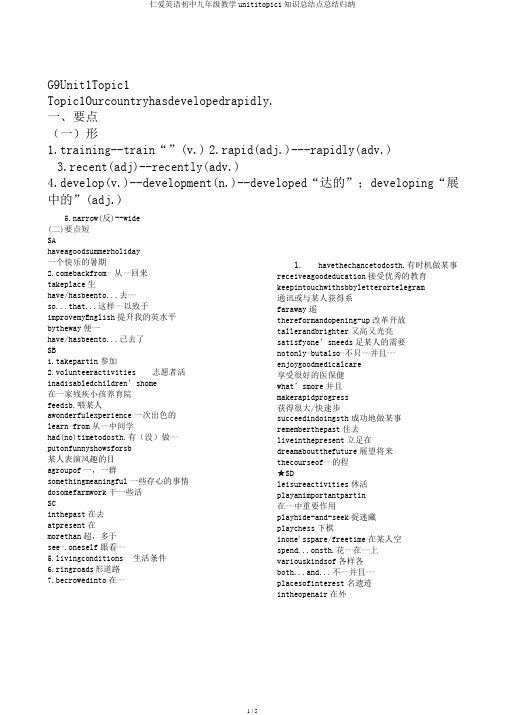
G9Unit1Topic1Topic1Ourcountryhasdevelopedrapidly.一、要点(一)形1.training--train“”(v.)2.rapid(adj.)---rapidly(adv.)3.recent(adj)--recently(adv.)4.develop(v.)--development(n.)--developed“达的”;developing“展中的”(adj.)5.narrow(反)--wide(二)要点短SAhaveagoodsummerholiday一个快乐的暑期ebackfrom⋯从⋯⋯回来takeplace生have/hasbeento...去⋯⋯so...that...这样⋯⋯以致于improvemyEnglish提升我的英水平bytheway便一have/hasbeento...已去了SB1.takepartin参加2.volunteeractivities 志愿者活inadisabledchildren’shome在一家残疾小孩养育院feedsb.喂某人awonderfulexperience一次出色的learn⋯from从⋯⋯中间学had(no)timetodosth.有(没)做⋯⋯putonfunnyshowsforsb某人表演风趣的目agroupof一,一群somethingmeaningful一些存心的事情dosomefarmwork干一些活SCinthepast在去atpresent在morethan超,多于see⋯.oneself眼看⋯⋯5.livingconditions 生活条件6.ringroads 形道路7.becrowedinto在⋯⋯1.havethechancetodosth.有时机做某事receiveagoodeducation接受优秀的教育keepintouchwithsbbyletterortelegram通讯或与某人获得系faraway遥thereformandopening-up改革开放tallerandbrighter又高又光亮satisfyone’sneeds足某人的需要notonly⋯butalso⋯不只⋯⋯并且⋯⋯enjoygoodmedicalcare享受很好的医保健what’smore并且makerapidprogress获得很大/快速步succeedindoingsth成功地做某事rememberthepast住去liveinthepresent立足在dreamaboutthefuture展望将来thecourseof⋯⋯的程★SDleisureactivities休活playanimportantpartin在⋯⋯中重要作用playhide-and-seek捉迷藏playchess下棋inone'sspare/freetime在某人空spend...onsth.花⋯⋯在⋯⋯上variouskindsof各样各both...and...不⋯⋯并且⋯⋯placesofinterest名遗迹intheopenair在外二、要点句型。
仁爱九年级全册知识总结
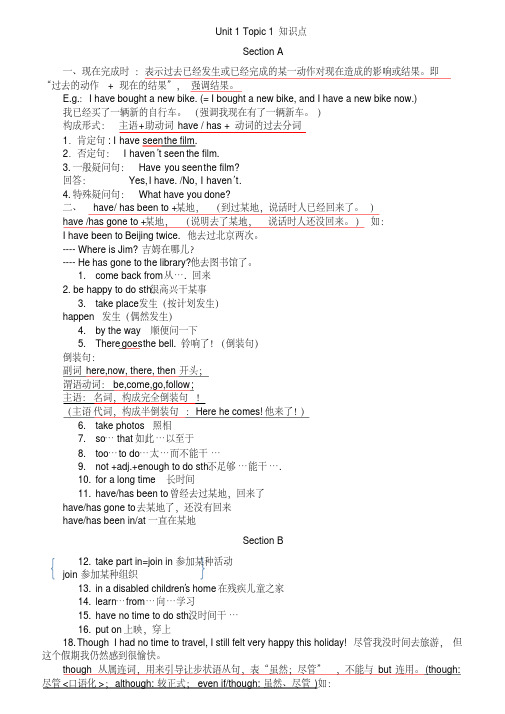
Unit 1 Topic 1知识点Section A一、现在完成时:表示过去已经发生或已经完成的某一动作对现在造成的影响或结果。
即“过去的动作+ 现在的结果”,强调结果。
E.g.:I have bought a new bike. (= I bought a new bike, and I have a new bike now.)我已经买了一辆新的自行车。
(强调我现在有了一辆新车。
)构成形式:主语+助动词have / has + 动词的过去分词1.肯定句: I have seenthe film.2.否定句:I haven’t seen the film.3.一般疑问句:Have you seenthe film?回答:Yes, I have. /No, I haven’t.4.特殊疑问句:What have you done?二、have/ has been to +某地,(到过某地,说话时人已经回来了。
)have /has gone to +某地,(说明去了某地,说话时人还没回来。
)如:I have been to Beijing twice. 他去过北京两次。
---- Where is Jim? 吉姆在哪儿?---- He has gone to the library?他去图书馆了。
e back from从…. 回来2. be happy to do sth.很高兴干某事3.take place发生(按计划发生)happen 发生(偶然发生)4.by the way 顺便问一下5.There goes the bell. 铃响了!(倒装句)倒装句:副词here,now, there, then开头;谓语动词:be,come,go,follow;主语:名词,构成完全倒装句!(主语代词,构成半倒装句:Here he comes! 他来了!)6.take photos 照相7.so… that如此…以至于8.too…to do…太…而不能干…9.not +adj.+enough to do sth.不足够…能干….10.for a long time 长时间11.have/has been to曾经去过某地,回来了have/has gone to去某地了,还没有回来have/has been in/at一直在某地Section B12.take part in=join in参加某种活动join参加某种组织13.in a disabled children’s home在残疾儿童之家14.learn…from…向…学习15.have no time to do sth.没时间干…16.put on上映,穿上18. Though I had no time to travel, I still felt very happy this holiday! 尽管我没时间去旅游,但这个假期我仍然感到很愉快。
仁爱九年级英语unit1知识点

仁爱九年级英语unit1知识点仁爱九年级英语Unit 1知识点在九年级英语课程的第一个单元中,我们学习了很多重要的知识点。
这些知识点涵盖了词汇、语法、阅读技巧等方面。
在本篇文章中,我将对这些知识点进行详细的介绍和解析。
首先,我们来讨论一下词汇方面的知识点。
在Unit 1中,我们学习了一些常见的英语词汇,例如:vowel(元音)、consonant (辅音)、syllable(音节)等等。
这些词汇是构建英语语言的基础,掌握它们有助于我们更好地理解和使用英语。
除了常见的词汇外,Unit 1还引入了一些与词性相关的词汇。
例如:noun(名词)、verb(动词)、adjective(形容词)和adverb(副词)。
这些词汇帮助我们理解句子的结构和语法规则。
学习它们能够让我们更准确地表达自己的意思。
接下来,我们来看一下语法方面的知识点。
Unit 1中,我们学习了一些重要的语法概念和规则。
例如:simple present tense(一般现在时)、simple past tense(一般过去时)、present continuoustense(现在进行时)等等。
掌握这些时态的使用方法,可以帮助我们更好地描述过去、现在和将来的事物。
此外,在Unit 1中,我们还学习了一些特殊的语法结构。
例如:比较级和最高级,以及它们的用法和变化形式。
这些结构在我们的日常交流中经常使用到,学会使用它们能够使我们的表达更加丰富和准确。
在阅读技巧方面,Unit 1提供了一些有关理解和分析文本的方法和策略。
其中包括:预测内容、查找关键信息、分析句子结构等等。
通过运用这些技巧,我们可以更好地理解和解读文本,提高我们的阅读能力。
最后,Unit 1还涉及到了一些写作技巧。
例如:如何描述人物、地点和事件,如何编写描述性和叙事性的文章等等。
这些技巧对我们的写作能力有很大的帮助,能够让我们的文章更有逻辑性和表达力。
总结起来,Unit 1是我们九年级英语学习的重要起点。
- 1、下载文档前请自行甄别文档内容的完整性,平台不提供额外的编辑、内容补充、找答案等附加服务。
- 2、"仅部分预览"的文档,不可在线预览部分如存在完整性等问题,可反馈申请退款(可完整预览的文档不适用该条件!)。
- 3、如文档侵犯您的权益,请联系客服反馈,我们会尽快为您处理(人工客服工作时间:9:00-18:30)。
九年级英语Unit1单元归纳复习及相应课堂习题Topic11. Have/has been to, have/has gone to 和have/has been in的区别主语+have/has been to + 地点“去过某地”(已返回)1主语+have/has gone to +地点“去了某地”(未回来)主语+have/has been in +地点+for +段时间(待在某地,动作可以延长一定时间,后面常接段的时间)She has been in Japan for 2 year.She has been to Japan. She has gone to Japan.▲地点是名词须接to ,如果地点是副词则不接to。
Tom has been there.▲对地点提问用:where2.频度副词already,yet ,just,ever,never,在现在完成时中的作用(1)already 用在肯定句,用与句中,句尾均可,“已经”I’ve finished my homework already. I’ve already finished my homework . (2)yet 用于否定句或疑问句,“还”,用于句末。
在现在完成时的用法中,肯定句常用already,改用否定句和一般疑问句时常把already改为yet(放句末)。
I have already found him.Have you found him yet ?(3)Just位于谓语动词前。
“刚刚”(也可以用于一般现在时,过去时态)He has just come back from France.(4) ever 多用与一般疑问句,否定句和条件状语从句中,“曾经”Have you ever been to France? No, I haven’t. /Yes,I have.If you ever happen to come here ,be sure to visit us.(5)never 多用于否定的陈述句中,“从不……”(反义词是ever)I have never travelled on a plane.(变成一般疑问句)Have you ever travelled on a plane?He is never late for school. (它还可以用于其他时态中)(6)before 做副词时,”从前“,句中谓语常用现在完成时和过去时。
I have never been to the place before.I saw her before.词组:变化中的世界回来发生/ 很大的变化变得越来越美丽照相、拍照你去哪里了(现在完成时态)英语暑假学校提高我的英语顺便问一问如此..以至于对..做出改进/改善铃响了看,他来了(用倒装) 从...中学习有(没有)时间做某事参加志愿者活动在暑假期间多精彩的一次经历啊为..提供帮助发达/发展中国家发展迅速在过去收到良好教育超过、多余亲眼目睹离..很遥远与..保持联系不但...而且取得进步在做某事方面获得成功在某人的帮助下各种各样现在完成时(一):概念: 表示过去发生或已经完成的动作对现在产生的影响或结果结构: has/have+done(动词的过去分词)have/has been to 、have/has gone to与have/has been in 区别:(1)“have/has been to +地名”表示“曾经去过某地”,说话时已经回到说话地点,常和once, twice,never, ever 等时间状语连用。
(2)“have/has gone to +地名”表示“去某地了”,现在还没回来,不在说话地点。
(3)“have/has been in+地名”表示“在某地”,常和一段时间连用。
Eg:She has been to Shanghai.她到过上海。
(现在不在上海。
)She has gone to Shanghai.她去上海了。
(可能在去上海的路上,或者已经到了上海,总之现在不在这里。
)She has been in Shanghai for ten years.她在上海10年了。
(10年前去的上海,现在还在上海。
)注意:现在完成时属于现在时态的范围,因而不能和表示过去的时间状语,如yesterday, last week, three years ago in 1960 等连用。
但可以和表示从过去某时刻延续到现在(包括“现在”在内)的一段时间的状语,如today,these days,since1980, for a long time等连用。
Eg:Have you seen her these day?( )1.—Where are Maria and Kangkang?—They _____ England.A.have been toB.are awayC.have gone toD.had been in( )2._____ the Great Green Wall, the land produces (生产出) more crops.A.Thanks forB.Thanks toC.Thank toD.Thank for( )3.I think that you have made so rapid _____ in math.A.a progressB.progressC.progressesD.progressed( )4.—How do you like Beijing, Miss Read?—I’ve no idea. I _____ there.A.have goneB.have beenC.haven’t beenD.haven’t gone( )5.—What _____ to your village in recent years?—Lots of roads, buildings, parks and so on.A.takes placeB.have happenedC.has happenedD.happened( )6.—What did you do during your summer holiday?—I spent my holiday _____ English in Summer Classes.A.improvingB.improvesC.to improveD.improve( )7. I have broken your glasses. I feel sorry _____ it.A.toB.atC.withD.for( )8.The family was _____ poor _____ they couldn’t buy a TV set.A.so; thatB.not; untilC.not; butD.so; but( )9.—_____ my daughter is only ten years old, she knows a lot.—What a clever girl!A.BecauseB.WhetherC.ThoughD.So( )10.—Have you seen my brother?—Yes. I _____ him in the library fiveminutes ago. A.metB.have metC.meetD.have been met( )11.This is the most beautiful park I have_____ visited.A.everB.yetC.neverD.already( )12.—Can you write the number eighty-five thousand, six hundred and twenty-six?—Yes, it is _____.A.85,626B.856,620C.58,662D.58,626( )13.Now most families have only one child _____ our country’s one-child policy.A.soB.becauseC.because forD.because of( )14.—David has made great progress recently.—_____, and _____.A.So he has; so you haveB.So he has; so have youC.So has he; so have youD.So has he; so you have( )15.China has the _____ population in the world.A.smallestB.mostrgestrge书面表达十年前,你的家乡非常落后,房屋低矮,外出只能骑自行车或步行。
而今,高楼林立,家乡人能乘坐公交车、小汽车外出工作或旅行。
请以Changes in Our Hometown为题,根据提示及内容要点写一篇80词左右的短文。
过去现在旧房高楼步行、骑自行车乘公交车、小汽车____________________________________________________________________ ____________________________________________________________________ ____________________________________________________________________ ____________________________________________________________________ ____________________________________________________________________ ____________________________________________________________________ ____________________________________________________________________Topic2:一、So do I . (前面提到的肯定情况同样适合另外一个主语。
“我也是这样”)Neither/Nor do I.(前面提到的否定情况同样适合于另外一个主语。
“我也不这样”)⑴-Tom is a kind man. -So____I.-The children should come earlier. -So______they.-Kangkang plays football well. -So______we.-They visited the farm. -So______he.-I have been to Beijing. -So______he.-Mike will leave here. -So______Maria.⑵-She isn’t a good worker. -Neither /Nor_____I.-He won’t go swimming. -Neither ______we.-They have never been to Fuzhou. -Neither______he.-We can’t go to the cinema. -Neither ______they.二,So it is. “的确如此“(表达两者对同一事物看法一致)so + 主语(代词)+ be/助动词/情态动词-The girl was at home. -So________.-Lucy came to the school. -So________.-Kangkang has been to Beijing. -So_________.三,分数,百分数⑴分数,分子用基数词,分母用序数词,分子大于1,分母用复数形式。
